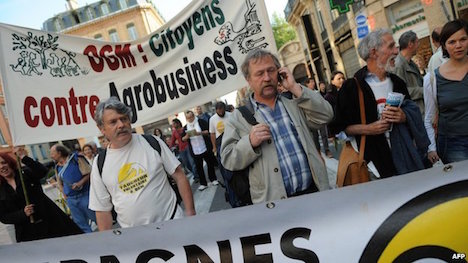|
By Staff Writers, BBC
BBC Newsworld
Tuesday, Jan 13, 2015
 |
| GM maize - file pic
Public opposition to GM cultivation is strong in Europe |
The European Parliament has passed a new law giving states more flexibility by a big majority.
A type of maize - MON 810 - is the only GM crop grown commercially in the EU.
Although Euro MPs and ministers have agreed to give states more flexibility, EU scientists will still play a key role in authorisations.
GM crops are used widely in the US and Asia, but many Europeans are wary of their impact on health and wildlife.
It is one of the toughest issues at the EU-US talks on a free trade deal, as farming patterns in Europe - including GM use - differ greatly from North America.
The new law only applies to crops and does not cover GM used in animal feed, which can still enter the human food chain indirectly.
Last July the new EU Commission President, Jean-Claude Juncker, said the legal changes were necessary because under current rules "the Commission is legally obliged to authorise the import and processing of new GMOs [genetically modified organisms], even in cases where a clear majority of member states are opposed to their use".
Spain is by far the biggest grower of MON 810 in Europe, with 137,000 hectares (338,000 acres), the European Commission says.
Yet the EU total for MON 810 is just 1.56% of the EU's total maize-growing area.
MON 810 is marketed by US biotech giant Monsanto and is modified to be resistant to the European corn borer, a damaging insect pest.
The maize variety is banned in Austria, Bulgaria, France, Germany, Greece, Hungary and Luxembourg.
 |
| Green activists in France, 5 Jun 08
Farmer-turned-MEP Jose Bove (centre) led anti-GM protests in France |
Disputed procedures
Under the new law, the grounds for a ban on any GM variety will be expanded. National governments will in future be able to cite factors such as protection of a particular ecosystem or the high cost of GM contamination for conventional farmers.
But the Greenpeace environmental group says the legislation has shortcomings, as it "grants biotech companies the power to negotiate with elected governments" on GM crops, rather than with the European Food Safety Authority (Efsa), and forces national environmental risk assessments to comply with Efsa's assessments.
The new law says states can only use environmental grounds that are "complementary" to Efsa's assessments of GM crops.
The UK government is among several countries, including Spain and Sweden, which have called for the EU's GM rules to be eased.
But the UK Conservative group in Strasbourg has criticised the new law, saying it "allows member states to proceed directly to national bans, rather than first seeking a more legally sound 'opt-out'".
Source URL
|
 Print This Print This

|

